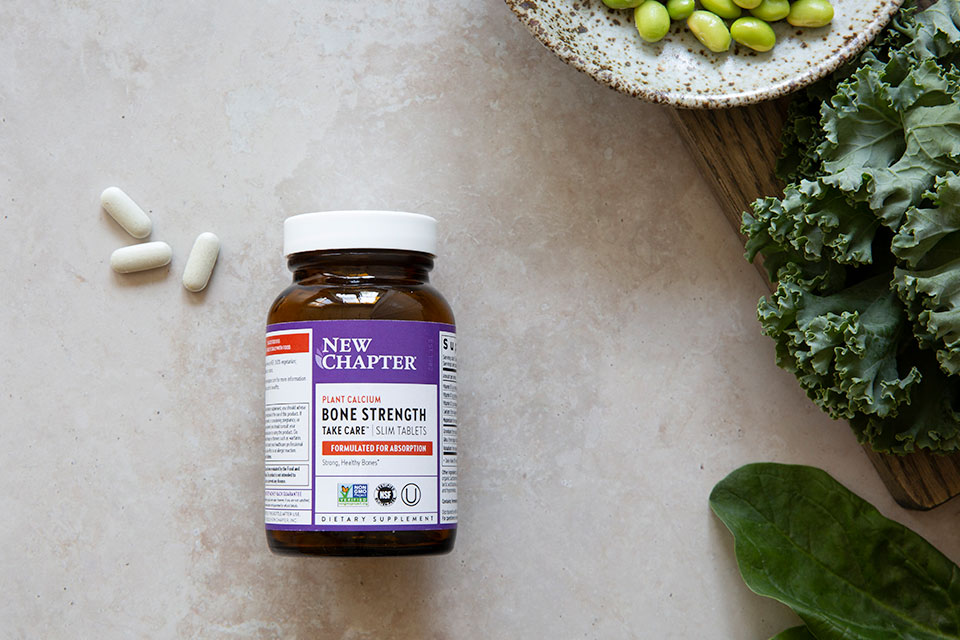What is Plant-Based Calcium? An Essential Guide
Calcium is an earth mineral with the atomic number 20. In its pure form, Calcium is a silvery metal, and it is the 5th most abundant element on the planet. It’s also abundant in the human body. Why is calcium so very important? Well, our bodies use calcium to aid in normal muscle and nerve function, blood clotting, cellular health, and the release of certain hormones. Calcium is even required for a normal heartbeat! Given this vital role, the body keeps calcium in the bloodstream at all times, and our bones and teeth act as a handy storage bank for calcium. And when blood calcium levels are low due to dietary intake, calcium is taken from our bones and used by the body—which can affect bone strength. Replacing lost amount of calcium on a daily basis is essential to maintaining normal calcium levels in bones.
!--split--
What are the Types of Calcium?
If you’re interested in getting a balanced intake of this critical bone mineral, there are different sources of calcium.
Calcium carbonate
- Elemental calcium: 40%
- Source: Calcium carbonate is usually mined and extracted from limestone rock. It is also available from certain species of marine algae harvested from the ocean floor. New Chapter’s Bone Strength Take Care is crafted with high-quality plant-based calcium carbonate from the sea called Red Marine Algae (Lithothamnion).
- Good to Know: This is the most commonly used form for calcium supplements. It has the highest concentration of calcium per tablet, meaning fewer tablets are required to get the desired dose. Calcium carbonate should be taken with meals, since acidity improves absorption.
Calcium citrate
- Elemental calcium: 21%
- Source: Calcium citrate is typically a byproduct of citric acid production. A fermentation process produces a broth rich in citric acid. Calcium hydroxide is added, causing calcium citrate to precipitate from the broth.
- Good to Know: This form is less dependent on acidity for calcium absorption, so it does not need to be taken with meals. However, the low concentration of calcium means more pills are required to get a specific amount of calcium into your routine (compared with calcium carbonate).
Calcium gluconate
- Elemental calcium: 9%
- Source: Calcium gluconate is typically produced by mixing gluconic acid with calcium carbonate or calcium hydroxide.
- Good to Know: Due to low elemental calcium concentration, this form is not typically used as a dietary supplement because it would require too many pills. It is commonly found as the form of calcium in intravenous calcium injections.
Calcium lactate
- Elemental calcium: 13%
- Source: Calcium lactate is typically produced by mixing lactic acid with calcium carbonate or calcium hydroxide.
- Good to Know: Due to low elemental calcium concentration, calcium lactate is not typically used as a dietary supplement because it would require too many pills.
Who Should Take a Calcium Supplement?
Taking a calcium supplement, such as high-quality calcium carbonate tablets, can be a nutritional “insurance policy” for any adult interested in maintaining bone strength throughout life. Both men and women begin to lose bone density every year starting around age 30. However, only women have the additional risk of losing ~10% of bone mass during their menopause years. So, young women can be proactive by taking calcium in their 20s and 30s to help build bones early. If you nourish your bones during your prime bone-building years, it can help you stay strong for life! In fact, to help young women take charge of their bone health, New Chapter created the FIRST daily
How Much Calcium Does Your Body Need?
Daily recommendations for adults vary slightly. This list of general calcium recommendations is from the National Institutes of Health.
| If you are: |
Recommended daily calcium: |
| Adult age 19–50 | 1,000 mg |
| Adult male age 51–70 | 1,000 mg |
| Adult female age 51–70 | 1,200 mg |
| Adult age 71+ | 1,200 mg |
| Pregnant and breastfeeding adult | 1,000 mg |
In general, adults get some of their recommended daily calcium from food. But many people may not be getting enough. You can make sure you’re getting adequate calcium intake by adding a calcium supplement to your day. (Talk to your healthcare professional with questions about the best calcium regimen for you.)

Calcium and Bone Health
The body stores calcium in your bones and will take any needed calcium from your bones if you’re not consuming enough. You also experience bone loss just due to age—both men and women begin to lose bone density every year starting around age 30. This can lead to a condition called osteoporosis, characterized by weak, brittle bones that are prone to fracture.
Fortunately, you can start today to protect your bone health and maintain your body’s essential structure over the
years. Take these steps to support strong, healthy bones:
- Stay physically active! Weight-bearing and resistance exercises are shown to help prevent osteoporosis. These include walking, dancing, running, and lifting weights. (Talk to your healthcare professional before starting an exercise program.)
- Eat well. The average diet provides some of the recommended calcium for adults. See below for some examples of calcium-rich food options you can add to your day.
- Supplement with care. The right calcium supplement accounts for the calcium you’re already getting from food—without over delivering. Bone Strength Take Care plant calcium is perfect for this, providing a fine-tuned amount of bone-supportive calcium to fill nutritional gaps and reduce the risk of osteoporosis.†
Calcium in Non-Dairy Foods
Dairy products are a good source of calcium, sure. But did you know that about 65% of adults in the world have lactose intolerance? This means many of us do not digest milk or dairy products well—so we can’t comfortably rely on milk products for dietary calcium. In addition, some people follow vegan, plant-based diets, so would not be getting calcium from dairy.
Fortunately, calcium is present in many non-dairy foods such as dark leafy greens, legumes, fish with bones, as well
as calcium-fortified juice or cereal. Here are some examples of calcium levels in these foods.
| Calcium-Rich Foods | Amount of Calcium |
| Tofu, prepared with calcium (1/2 cup) | 434 mg |
| Orange juice, calcium fortified (1 cup) | 349 mg |
| Collard Greens, cooked (1 cup) | 122 mg |
| Kale, cooked (1 cup) | 95 mg |
| Dried Beans, cooked or canned (1 cup) | 180 mg |
| Sardines, canned, with bones (3 ounces) | 325 mg |
| Salmon, canned, with bones (3 ounces) | 180 mg |
| Almonds (1/4 cup) | 100 mg |
| Sources for nutrition data: Cleveland Clinic, Dietary Guidelines 2015-2020 | |
Sustainable Sourcing of Plant-Based Calcium
New Chapter is a Certified B Corporation , meaning we meet the highest standards for social and environmental impact. Part of our mission has always been to nurture and sustain Mother Earth, the source of natural healing. Because plant calcium is a whole food, it can be sourced sustainably, which is crucial for our promise to uphold a supply chain that is socially responsible and environmentally sound. We know our suppliers and the origins of their plant harvest—the Red Marine Algae ( Lithothamnion) grows in the pristine waters off the coast of Iceland. It is allowed to mature naturally, then harvested from its marine habitat while leaving the young, living plants untouched. Utilizing calcium from plants, not rocks, lets us deliver the quality you expect with responsibly wild-crafted, whole-food Calcium. No limestone, no animal bone, no subpar ingredients—just pure, bone-strengthening calcium that your body can recognize as food.
Is Plant-Based Calcium Better Than Other Types?
Calcium carbonate that is not from plants is typically derived from limestone rock (essentially chalk) and it has a flat, basic architecture that lacks other bone-supportive nutrients. Plant calcium is different. It’s complex and porous, containing an intricate matrix of minerals in a natural honeycomb structure. It supports bone health holistically, with whole-food Calcium, Magnesium, and 70 important trace minerals (also including Strontium and Silica).
Another cool fact about
Lithothamnion is that it’s been clinically studied for other benefits in addition to bone support. Bone
Strength Take Care’s plant-sourced Calcium, Magnesium, and multiple trace minerals have been shown to support
movement, joint flexibility, and joint function.* Maintaining aspects of bone and joint health daily can pay off,
supporting mobility for better quality of life. The very basis of mobility is joint flexibility—a healthy range of
motion in the places where muscle, connective tissue, and bones meet. From the hard-working knee to the
intricately articulated finger, joints are complex intersections of structure and function that can
be affected by age and by daily use. Bone Strength Take Care’s whole-food nutrients can help maintain joint health,
and even be a holistic alternative or addition to glucosamine.*

How to Maximize Absorption of Calcium
Potentially as important as the source of calcium is whether it’s formulated for your body to really absorb. The addition of Vitamins D3 and K2 help your body maximize absorption of the calcium and direct it to the bones where it’s supposed to be.
So how do you choose the most absorbable calcium? By making sure you’re choosing a calcium-vitamin blend that also
includes K2 and D3.
Bone Strength Take Care is formulated with an
exclusive blend of Vitamins K2 and D3 designed to help your body absorb Calcium properly.* Our food-sourced Vitamin
K2 helps direct Calcium into your bones, where you need it.* Vitamin K2 also functions to help maintain artery
health.* Our fermented Vitamin D3 helps the body to effectively use Calcium to promote normal bone creation and
mineralization.* Think of Calcium as the bricks, and Vitamins K2 and D3 as the mortar. It’s ideal to have them
together—as in Bone Strength Take Care.
Should You Take a Calcium Supplement?
You may wish to add a calcium supplement to your daily routine to be sure you’re getting this key mineral in a formula that’s crafted for maximum absorption. Delivered in an easy-to-swallow slim tablet, Bone Strength Take Care’s holistic calcium formula offers a slow, steady release for the body’s consistent nourishment.* This hard-working calcium supplement delivers 3 complete benefits:
- Bone Strength Support. Calcium helps reduce osteoporosis risk† and supports bone strength and bone mineral density.*
- Joint Health Support. Our clinical strength calcium complex has been shown to support movement, joint flexibility, and joint function.*
- Heart Health Support. Maintains artery health with Vitamin K2 and supports cardiovascular health with Vitamin D3 (according to emerging studies).*
Is ‘Too Much Calcium’ A Problem?
Calcium is important, but excess doses of calcium are not recommended. As noted above, the right calcium supplement accounts for calcium you’re already getting from food (which is recommended to be around 1000-1200 mg a day for adults). You don’t need more than that on a regular basis.
The Bottom Line
Our bodies understand and seek whole-food sources of nutrition. New Chapter Bone Strength Take Care is formulated with a wild, whole-food plant source that is rich in available calcium, along with magnesium and 70 other important trace minerals. We add an exclusive blend of Vitamins K2 and D3 to ensure the body absorbs the plant-based calcium properly and effectively. Please learn more on our product page—scroll down to see what customers are saying!

†Adequate calcium throughout life, as part of a well-balanced diet, may reduce the risk of osteoporosis.






